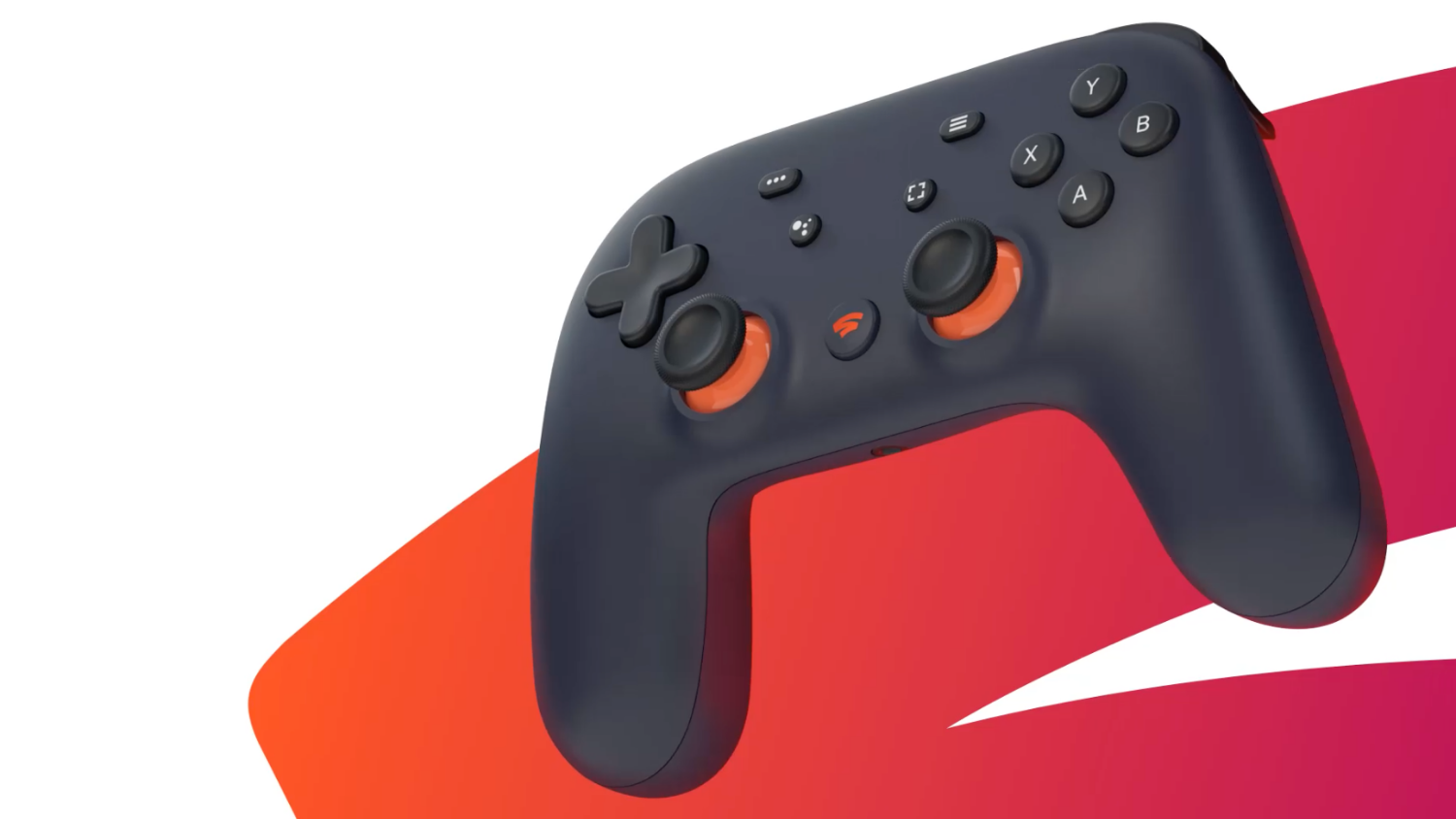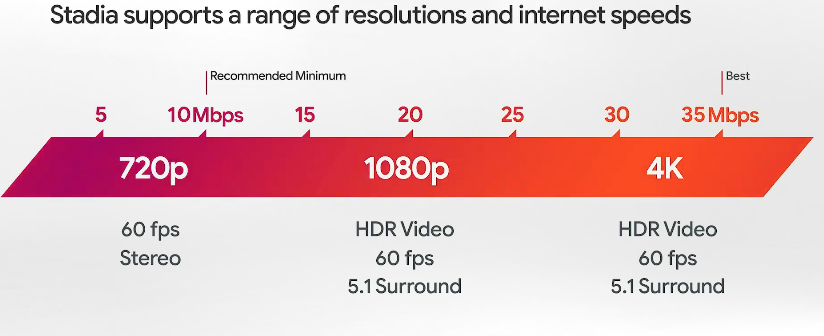Google Stadia at 4K Could Use 1TB of Data in 65 Hours, Report Says
Yesterday, Google announced pricing, release plans and data requirements for its Stadia streaming service. That includes a recommended minimum of 10 Mbps down for 720p resolution at 60 frames per second (fps) and stereo sound, 20 Mbps for 1080p resolution at 60 fps with HDR and 5.1 surround sound and 35 Mbps for 4K gaming at 60 fps with HDR and 5.1 surround sound.
The folks over at PC Gamer have done some math, and that can add up really, really quickly.
Specifically, they suggest that it "works out to around 15.75GB per hour of 4K streaming, 9GB per hour of 1080p, or 4.5GB per hour at 720p." At 4K, that would mean hitting 1TB of data in 65 hours or 113 hours for 1080p.
And if you have a data cap, that means you could hit it relatively quickly, especially if you do anything else online, like streaming video or uploading and downloading large files.
When asked for comment, Google said that it "will have more to share on specifics closer to launch, this announcement was mostly about games and pricing."
Google Stadia will release in November, with a $10 Pro tier that allows up to 4K gaming streaming, 5.1 surround sound and some occasional free games. For $129, a Founder's Edition will include a dark blue controller, three month subscription (and three months for a plan) and a Chromecast Ultra. The Stadia Base plan will go up to 1080p and won't require a subscription. On either plan, new games will have to be purchased separately.
The list of games that will be available on Stadia includes Destiny 2, Baldur's Gate III, Gylt, Mortal Kombat X, Tom Clancy's Ghost Recon: Breakpoint, Get Packed, Shadow of the Tomb Raider and Doom Eternal.
Get Tom's Hardware's best news and in-depth reviews, straight to your inbox.
Update: June 7, 12:40 p.m. ET - This story has been updated with comment from Google.

Andrew E. Freedman is a senior editor at Tom's Hardware focusing on laptops, desktops and gaming. He also keeps up with the latest news. A lover of all things gaming and tech, his previous work has shown up in Tom's Guide, Laptop Mag, Kotaku, PCMag and Complex, among others. Follow him on Threads @FreedmanAE and BlueSky @andrewfreedman.net. You can send him tips on Signal: andrewfreedman.01
-
derekullo Maybe if Google slid a little money under the table to popular ISPs to not count Stadia bandwidth against data caps ...Reply -
derekullo Cox limits me to 1 terabyte a month on my gigabit plan.Reply
They do have an unlimited plan for $50 a month more.
I average 500-800 gigabytes a month so no complaints.
My 9 terabyte Crashplan backup is about 97% complete so I expect the data usage to go down significantly. -
TJ Hooker Reply
The hardware running the games lives in the google cloud. You just stream to your local device(s), which can pretty much anything that can run google chrome AFAIK.AnimeMania said:Does anybody know if you own the Google Stadia device or just rent it? -
Finstar Replyderekullo said:Cox limits me to 1 terabyte a month on my gigabit plan.
They do have an unlimited plan for $50 a month more.
I average 500-800 gigabytes a month so no complaints.
My 9 terabyte Crashplan backup is about 97% complete so I expect the data usage to go down significantly.
None of my local ISPs even sell limited plans.
You can literally get an unlimited plan for 3.90€/month here, the speed will be just 128kb/s though.
I myself have an unlimited 150mb/s 4G wireless plan that i'm paying 25€/month for. No fiber connection here sadly since i kinda live in the middle of nowhere.
For 45€/month you'll get an unlimited 1000mb/s 5G plan. -
hotaru251 Reply
Comcast has a 1TB cap.Finstar said:Wait... data caps are still a thing?
ATT afaik doesnt, but they also have sh*t speed i doubt 24/7 could even HIT 1tb in a month. -
AnimeMania Reply
So that controller looking thing in all the pictures is not part of the service. They are idiots for not forcing people to buy/rent that controller in order to use the service.TJ Hooker said:The hardware running the games lives in the google cloud. You just stream to your local device(s), which can pretty much anything that can run google chrome AFAIK. -
TJ Hooker Reply
Oops, my bad, yeah I think you need to buy the official Stadia controller. Looks like you need a chromecast ultra as well.AnimeMania said:So that controller looking thing in all the pictures is not part of the service. They are idiots for not forcing people to buy/rent that controller in order to use the service.
Edit: OK, I don't know what I'm talking about. Apparently to play on Chrome/mobile you don't need any additional hardware (can use your own controller) but to play on TV you need chromecast ultra + stadia controller. But what if your TV has built in chromecast? And I assume could just connect your PC/laptop running Chrome to your TV if you want?
"Do I need to use your Controller? (Stadia Controller)No, you can use many popular HID compliant controllers when playing via USB cable on Chrome or mobile. To play on your TV you will need to use the Stadia Controller and Google Chromecast Ultra."https://support.google.com/stadia/answer/9338946?hl=en -
cryoburner Reply
How would that help them in any way? It would just increase the cost of entry and make people less likely to try the service. You still need to pay for games, and that's where they intend to make their money.AnimeMania said:So that controller looking thing in all the pictures is not part of the service. They are idiots for not forcing people to buy/rent that controller in order to use the service.
As for the massive bandwidth requirements, yeah, that's pretty much a given for this type of service. If someone averaged around 2 hours of gaming a day, they could easily burn through a terabyte of data within a month. The bitrate at 60 frames per second is going to be quite high as far as streaming video goes. And even with that relatively high bitrate, the video quality is still not going to come close to that of a game rendered locally at the same resolution. 4K on this service is likely to look more like upscaled 1080p at just 35mbps, and 1080p will likely look more like upscaled 720p. This is lossy compression performed in real-time at a limited bitrate, so it's not going to look great. And of course, people in most areas are likely to experience significant input latency, which will probably be more of a deal-breaker.

